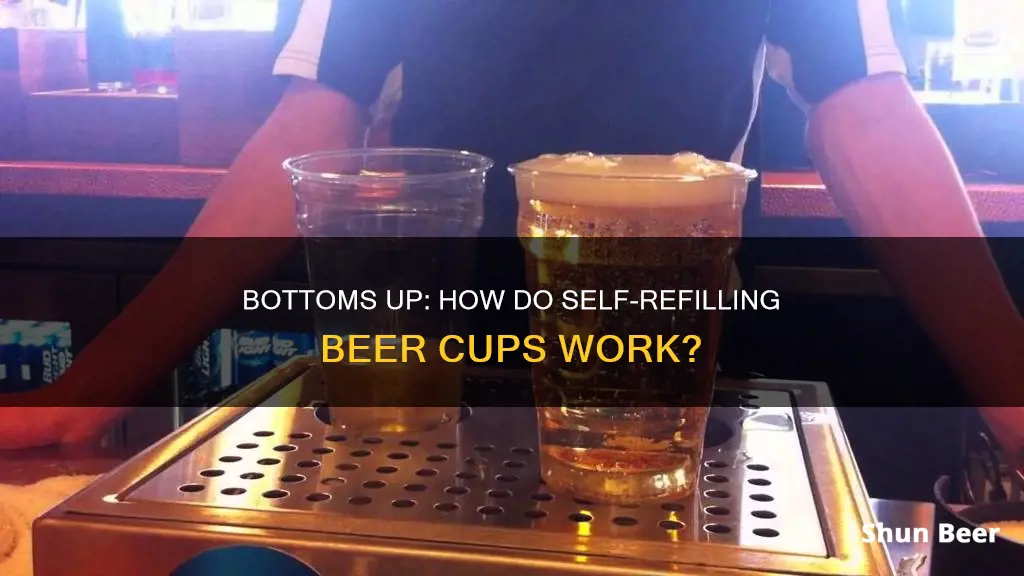
The Bottoms Up beer dispenser is a machine that fills cups from the bottom up, with the promise of faster pouring, hands-free hygiene, and novel marketing opportunities. The machine fills cups from the bottom using magnets. The cups have a hole in the bottom with a metal ring that is sealed with a magnet. When the cup is placed on the dispenser, the magnet is lifted, and beer is allowed to flow into the cup. The beer is dispensed to a pre-programmed level, and once it is finished dispensing, the cup is removed, and the magnet falls back into place, sealing the liquid inside.
| Characteristics | Values |
|---|---|
| Inventor | Josh Springer |
| Inventor's Company | Bottoms Up Draft Beer Systems |
| Inventor's Company Customers | Taco Bell Cantina, Beef O'Brady's, Walk-On's Sports Bistreaux |
| Competitors | Reverse Tap, Base Flow |
| Benefits | Faster pouring, hands-free hygiene, novel marketing opportunities |
| How it works | Magnets seal the hole in the cup's bottom; when the cup is placed on the dispenser, the magnets are lifted away and beer is poured without leakage |
| Pouring Speed | 44 pints per minute with one person operating, 56 pints per minute with multiple operators |
| Cost | $4000 for the dispenser, additional costs for magnet-driven cups, glasses, and pitchers |
| Cups | Available in disposable and reusable varieties |
What You'll Learn

The cups have holes and magnets
The "Bottoms Up" beer dispenser fills cups from the bottom, using magnets and a hole at the bottom of the cup. The cup has a small hole at the bottom, which is covered by a circular magnet. When beer is dispensed, the pressurised beer lifts the magnet up, allowing the beverage to fill the cup. Once the cup is full, the weight of the beer on the magnet pushes it back down, sealing the bottom and preventing leaks.
The magnet is floppy and circular, resembling a fridge magnet, and sticks to a corresponding donut-shaped strip around the filling hole. This system is designed for plastic cups and is not suitable for glass cups. The cups are also disposable, with the magnets serving as an advertising device, often ending up on people's refrigerators.
The "Bottoms Up" system is ideal for high-volume bars and large venues like stadiums, as it minimises spilling and can fill up to 56 pints per minute with multiple servers. It can be hooked up to any keg, and its speed and efficiency result in reduced staff requirements during peak times.
However, there are some drawbacks to this system. The magnets are designed for single-use and tend to warp and cause drips. Additionally, it is not suitable for beers that require a significant amount of head, as the system limits and reduces the head, especially when pouring multiple pints in a row.
The Science of Beer Tubes: How Do They Work?
You may want to see also

The magnets seal the cups
The Bottoms Up beer dispenser fills cups from the bottom through a hole in the cup, which is plugged by a removable magnet. The plastic glasses have a floppy, circular magnet inside, which sticks to a corresponding donut-shaped metal ring around the filling hole. When the cup is placed on the dispenser, the magnet is pushed up, breaking the seal, and beer is allowed to flow into the cup. Once the beer has finished dispensing, the cup is removed and the magnet falls back into place, sealing the liquid inside.
The magnets are typically printed with slogans, pictures, or discount offers, and can be collected or traded. They can be pushed out of the cup when it is empty and taken home. Some bars run games and promotions where people have to collect magnets to spell out a word or phrase.
While the magnets are effective at sealing the cups, they are more or less single-use, as they tend to warp and cause drips. This can result in odd spills, especially if the magnet is played with or bumped. However, the use of magnets allows for faster pouring, with the Bottoms Up dispenser capable of pouring up to 44 pints per minute with just one person operating it.
The Science Behind Beer Koozies: Do They Really Work?
You may want to see also

The magnets are lifted when cups are placed on the dispenser
The Bottoms Up beer dispenser is a machine that fills cups from the bottom, pouring up to 44 pints per minute with a single operator. This innovative system works using magnets. The plastic cups have a small hole at the bottom, covered by a floppy, circular magnet. When the cup is placed on the dispenser, the magnet is lifted, allowing pressurised beer to flow into the cup. As the beer fills the cup, the weight of the beer on top of the magnet increases until it pushes the magnet back down, resealing the hole and stopping the flow of beer. This magnet-powered method is not only faster than traditional pouring methods but also minimises spilling.
The Bottoms Up system was developed by Josh Springer at GrinOn Industries. Springer originally intended to create a pitcher with a latch on the bottom but switched to the magnet-based system due to the high development cost of the former. The GrinOn cups cost only 30 cents more than normal disposable cups, and the magnets can be used for advertising, providing an additional revenue stream. After successful beta testing at several venues in Las Vegas, the Bottoms Up system is expected to be implemented at many more stadiums.
Beer Benefits for Hair: A Guide
You may want to see also

Beer is dispensed upwards
The Bottoms Up beer dispenser is a machine that fills cups from the bottom up, pouring beer upwards through a hole in the bottom of the cup. This is made possible by magnets. The plastic cups have a hole in the bottom with a metal ring that is sealed with a magnet. When the cup is placed on the dispenser, the magnet is lifted, and beer is dispensed upwards into the cup. The magnets fall back into place when the cup is removed from the dispenser, sealing the liquid inside. This system offers several advantages, including faster pouring, hands-free hygiene, and novel marketing opportunities.
The Bottoms Up system can pour up to 44 pints per minute with a single operator, and even more with additional helpers. This increased speed can significantly improve efficiency and revenue for busy bars, stadiums, and festivals. It also frees up bartenders' time, allowing them to multitask and perform other tasks simultaneously, such as taking card payments, wiping surfaces, and preparing other drinks.
In addition to speed and efficiency, the Bottoms Up dispenser also offers hygiene benefits. Traditional pouring methods use a long spout or nozzle that can become coated with stale beer, potentially leading to unhygienic situations. The Bottoms Up system eliminates this issue by removing the need for a nozzle.
Another unique feature of the Bottoms Up system is the use of magnets as a marketing tool. The magnets at the bottom of the cups can be customised with branding, slogans, pictures, or promotional offers. Patrons can collect, trade, and take home these magnets, providing portable advertising for the venue.
While the Bottoms Up system offers numerous benefits, there are also some considerations. The system is more expensive than conventional alternatives, and it requires specially made cups with magnets. The magnets are designed for single use and must be replaced with each pour, resulting in additional waste. However, the speed, efficiency, and marketing opportunities provided by the Bottoms Up system may outweigh these drawbacks for high-demand venues.
Beer Traps: Effective Snail Control or Urban Myth?
You may want to see also

The magnets fall back to seal the cups when removed from the dispenser
The Bottoms Up beer dispenser is a machine that fills cups from the bottom, with the beer injected to the right level automatically. The cups have a hole in the bottom, which is plugged by a removable magnet. The magnet is a floppy, circular strip that sits on the hole, surrounded by a tin ring. When the cup is placed on the dispenser, the magnet is lifted away, allowing the beer to flow into the cup. Once the cup is full, the bartender simply removes the cup, and the magnet falls back onto the ring, covering the hole and creating a seal.
The magnets are designed for single use and must be replaced with each pour. They are typically printed with slogans, pictures, or discount offers, and customers can collect or trade them. The magnets can be pushed through the hole, so it is important to be careful when handling the cups. However, the magnets ensure that the cups are sealed when removed from the dispenser, preventing any spills or leaks.
The Bottoms Up system offers several benefits, including speed, efficiency, and improved hygiene. It fills a typical pint in six seconds and can reach speeds of up to 56 pints per minute. The pre-programmed pouring technology means that glasses will never overflow, allowing bartenders to multitask and improve the overall efficiency of the bar or restaurant. Additionally, the Bottoms Up system does not use a long spout or nozzle, reducing the risk of transferring stale beer from previous pours into a new glass.
While the Bottoms Up system offers significant advantages, there are also some drawbacks. The cups are more expensive than conventional glasses or cups, and the magnets that power them must be replaced with each pour, generating more waste. Despite these considerations, the Bottoms Up system has been well-received, with some venues reporting increased sales and improved efficiency for bartenders.
Miller Beer Text Rebates: How Do They Work?
You may want to see also
Frequently asked questions
The cups have a hole in the bottom that is plugged by a removable magnet. When the cup is placed on the dispenser, the magnet is lifted, and beer is injected to the right level automatically. Once the cup is removed, the magnet falls back into place, sealing the liquid inside.
These cups are made of plastic or glass and have a hole in the bottom with a metal ring that is sealed by a magnet. The magnet is a round disc that looks like a poker chip.
These cups help maximize efficiency during peak hours, thereby improving the bottom line. They also eliminate the need for a long spout or nozzle, which can be unhygienic as the coating of stale beer from previous pours can get into the new glass.
The Marriott World Center in Orlando, Florida, and restaurant chains like Taco Bell Cantina, Beef O'Brady's, and Walk-On's Sports Bistreaux have implemented this technology.







